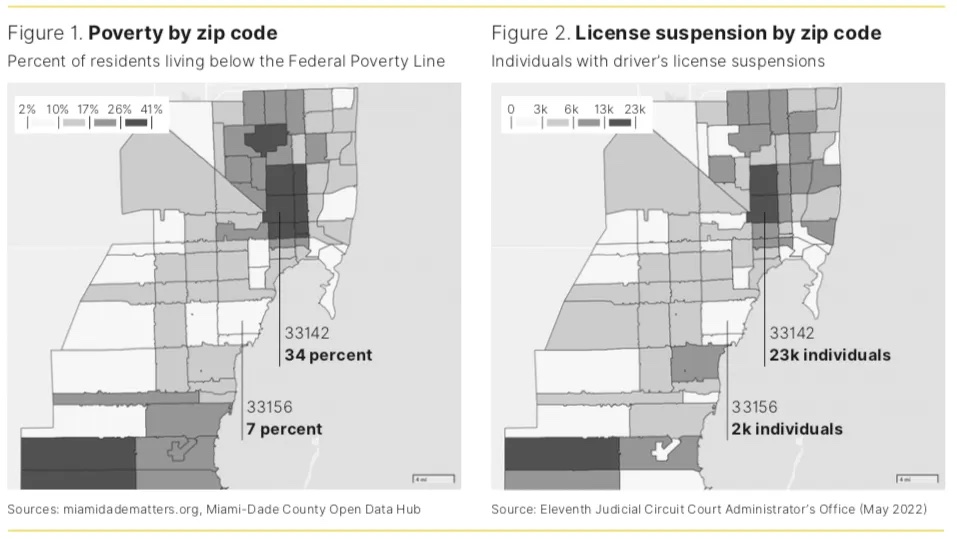


600,000 people in Miami-Dade County have a suspended driver’s license. 94% for failure to pay a fine or appear in court. By comparison, only 2.2 percent stem from Driving Under the Influence (DUI) and 0.6 percent for Reckless Driving.
Non-safety related license suspensions disproportionately affect low-income residents (see graphic below), they also needlessly drain government resources, decrease tax revenue, and harm the economy.

Suspending driver’s licenses for reasons unconnected to safety issues is a problem across the United States. The American Association of Motor Vehicle Administrators (AAMVA) summarizes the problem succinctly: “Although there is a clear societal interest in keeping unsafe drivers off the roads, broadly restricting licenses for reasons unrelated to an individual’s ability to drive safely may do more harm than good. This is especially true in areas that lack alternative means of transportation. Local communities, employers, and employees all experience negative consequences as a result of non-highway safety suspensions, including unemployment, lower wages, fewer employment opportunities and hiring choices, and increased insurance costs.”

In 2018, Ker-twang partnered with Commissioner Eileen Higgins to conduct in-depth interviews with County residents who have a range of license suspension experience to identify the major barriers to paying fines and key differences between people who had and did not have their license suspended. We also worked to quantify the scale and cost of avoidable license suspensions to the County and map the customer experience of getting a ticket, having one’s license suspended, and attempting to get it reinstated.
Our work led to the adoption of legislation establishing a Miami-Dade Driver’s License Suspension Task Force to review debt-based driver’s license suspensions in Miami-Dade and identify high-impact solutions.
Ker-twang supported the Task Force with facilitation, research, and analysis. The task force included representatives from the Chief Judge of the Circuit Court for the Eleventh Judicial Circuit; Clerk of Courts; Miami-Dade State Attorney, Public Defender, Mayor’s Office, State Legislative Delegation, Association of Chiefs of Police, and League of Cities; Miami-Dade County’s Information Technology Department; and a community member directly impacted by a debt- related driver’s license suspension.
Among other things, we found that a disproportionate number of drivers with a suspended license in Miami-Dade are from low-income zip codes where residents may not have the financial resources needed to repay their debt, especially if they lost a job as a result of a license suspension. We also documented how driver’s license suspensions for failure to pay fines and fees create long-term impacts on the physical and economic mobility of Miami-Dade residents.
The Miami-Dade County Driver’s License Task Force report and recommendations can be read here, starting on page 11, after the County memorandum.
Ker-twang has been working with Miami-Dade County since 2023 to implement the Task Force’s recommendations. We are providing project management, research support, and service design for initiatives such as creating a new Driver’s License Compliance Court, getting in touch with the tens of thousands of Miami residents who are eligible to have their license reinstated, and simplifying the payment process.